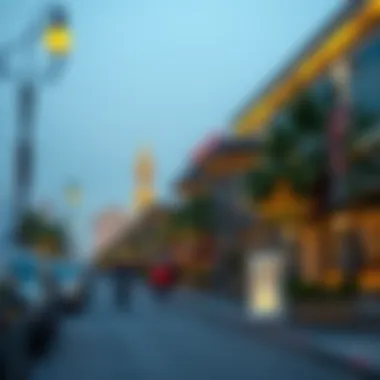Public Holidays in the UAE for 2024: An In-Depth Guide


Intro
The United Arab Emirates is a patchwork of rich traditions, vibrant cultures, and modern advancements that coexist harmoniously. As we look forward to the public holidays in 2024, it's essential to comprehend the deeper narratives these days carry with them. Each holiday isn't merely a day off work; it encapsulates the UAE's history, values, and social fabric. This guide aims to illuminate the significance of these holidays, as well as their implications for various economic sectors, particularly business and tourism. Moreover, with a keen eye on the real estate landscape in Dubai, we will explore how these holidays affect investment decisions and personal planning for both residents and expatriates.
A Cultural Touchstone
In the hustle and bustle of modern life, UAE's public holidays offer a moment of respite. They serve as reminders of the country's cultural heritage, anchored in Islamic traditions and local customs. Understanding the broader implications of these holidays—such as when families gather for communal meals or when markets see a surge in visitors—can significantly shape business strategies. This is particularly true in the realms of tourism and real estate.
Economic Ripple Effects
When the calendar rings in a holiday, the effects can ripple throughout the economy. The influx of tourists during these festive times often boosts local businesses, especially in hospitality and retail. Consequently, understanding the public holidays can help investors forecast trends, anticipate market fluctuations, and strategize accordingly.
As we delve into the public holidays for 2024, it’s not just about identifying the dates; it’s about grasping how they weave into the broader economic tapestry. The forthcoming sections will dissect these holidays, focusing on their cultural significance as well as their influence on businesses and the lucrative property market in Dubai.
Intro to Public Holidays in the UAE
Public holidays in the United Arab Emirates hold a significant place in the cultural and social fabric of the nation. These days are not merely time off work; they serve as periods for reflection and celebration, enriching the community’s bonds while also impacting various sectors such as business and tourism. Understanding these holidays is essential for anyone interacting with the UAE, be it investors, homeowners, or professionals in the market.
Consider the broader implications; holidays like Eid and National Day resonate deeply within the nation’s identity. They symbolize historical milestones and religious observances that are vital to the UAE’s culture. On these occasions, it's common to see families and friends coming together, fostering relationships that contribute to the stability and growth of the society. Thus, knowing when these holidays fall can aid in personal planning, avoid scheduling clashes, and leverage opportunities in sectors such as real estate.
From one perspective, recognising public holidays helps businesses strategize their operational timelines. For example, sectors like tourism and hospitality may see an uptick in demand during these holidays, as they attract both local and international visitors. On the flip side, understanding when these holidays occur can inform real estate investors and developers on when to ramp up activities, aligning their projects with consumer needs.
Moreover, there are additional layers to consider, like whether the holidays are observed on their official dates or adjusted. Acknowledging these variations helps in preemptive planning.
In summary, public holidays in the UAE for 2024 provide not just a point of interest but a pathway for strategic insights in various fields. Recognizing their relevance not only enriches personal and professional interactions but may also foster a more informed approach to investment and business decisions.
Overview of Public Holidays
In the United Arab Emirates, public holidays are more than just days off from work; they are moments steeped in tradition and cultural significance. Understanding the public holidays in the UAE for 2024 is essential, as these holidays not only bring communities together but also shape the economic landscape of the region. Investors, homeowners, and business managers must consider how these holidays affect various sectors, from real estate to tourism.
The year 2024 will see a mix of Islamic and national holidays, each with its unique importance. Observing these dates allows businesses to plan effectively, while individuals can enjoy time with family and partake in local festivities. By being aware of when these holidays occur, stakeholders can make informed decisions regarding investments and planning.
Major Holidays and Their Dates
In 2024, the UAE will observe several public holidays. Here’s a snapshot of the key dates:
- New Year's Day - January 1, 2024
- Eid Al Fitr - Expected around April 10, 2024 (exact date to be confirmed)
- Arafat Day - June 15, 2024 (expected)
- Eid Al Adha - June 16, 2024 (exact date to be confirmed)
- Hijri New Year - July 6, 2024 (anticipated)
- Prophet Muhammad's Birthday - September 15, 2024 (expected)
- UAE National Day - December 2, 2024
Each of these holidays holds not just nationwide recognition but a deeper cultural resonance with the people of the UAE. Understanding the potential changes in dates based on the lunar calendar, particularly for Islamic holidays, can greatly assist in planning.
Significance of Each Holiday
Each holiday mentioned marks a significant time in the UAE’s calendar, celebrated with various traditions that reflect the values and history of the nation.


- New Year's Day is a jubilant occasion, typically celebrated with fireworks and family gatherings. It symbolizes fresh beginnings and is also an opportunity for businesses to launch new strategies.
- Eid Al Fitr celebrates the end of Ramadan. This is a time of feasting, giving to charity, and family gatherings, marking an important closure to the month of fasting. Its impact on retail and hospitality sectors is substantial as people are inclined to travel and shop.
- Arafat Day occurs before Eid Al Adha, and though it is not celebrated as a public holiday in a festive manner, it carries significant spiritual meaning for Muslims, especially those performing the Hajj pilgrimage.
- Eid Al Adha, known as the Feast of Sacrifice, highlights the importance of community and sharing. Families often host large meals, which can boost restaurant and catering businesses.
- Hijri New Year marks the start of the Islamic lunar calendar. Traditions may vary, but it is often observed quietly and with reflection.
- Prophet Muhammad's Birthday, known as Mawlid, is a time for reflection and gratitude. While celebrations differ among various communities, it represents a venerable occasion in the Islamic faith.
- UAE National Day, held on December 2, is a day of national pride, celebrating the union of the emirates. It is characterized by parades, fireworks, and cultural events, fostering a sense of unity. This holiday stimulates substantial economic activities in tourism and retail sectors as citizens and expatriates celebrate together.
Understanding these aspects of public holidays not only enriches the cultural experience of living or working in the UAE but also influences strategic planning across various business sectors.
Specific Holidays in
Understanding the public holidays in the UAE for 2024 is essential not only for residents but also for investors, homeowners, and business professionals. These holidays reflect the diverse cultural tapestry of the UAE and carry significant implications for various sectors such as tourism, retail, and even real estate. Each holiday brings its own unique flavor, offering opportunities and challenges that stakeholders need to navigate.
New Year's Day
New Year's Day, celebrated on January 1st, marks the beginning of the Gregorian calendar year. This holiday holds a special place in the hearts of many as it symbolizes fresh starts and new opportunities. Various events such as fireworks and social gatherings take place across the country. Businesses often see increased sales during this period as consumers indulge in leisure activities and shopping, setting the tone for the year ahead.
Eid Al Fitr
Eid Al Fitr, which comes at the end of Ramadan, typically involves a public holiday lasting several days. The exact dates depend on lunar sightings; in 2024, it is expected to fall around April 10th. This holiday commemorates the end of fasting and is marked by communal prayers, feasting, and charitable giving. The hospitality and retail sectors generally thrive during this time, as families gather for celebrations and special meals. Properties that are oriented towards family entertainment or dining experience often see a substantial uptick in activity during Eid.
Arafat Day
Arafat Day falls on the second day of Hajj, the Islamic pilgrimage, and it is anticipated to occur on June 16th in 2024. This day is highly significant for Muslims; it is a time of reflection and seeking forgiveness. Many UAE citizens observe this day by fasting and engaging in prayer. As businesses recognize the importance of this holiday, they may adjust operating hours, especially in the hospitality sector, where traditional meals and gatherings take center stage.
Eid Al Adha
Following Arafat Day, Eid Al Adha, also known as the "Festival of Sacrifice," is observed. In 2024, Eid Al Adha is likely to fall on June 17th. This holiday celebrates the willingness of Ibrahim to sacrifice his son in obedience to God, marking it as a time for family gatherings, prayers, and the sacrifice of livestock, the meat from which is distributed among family and the needy. It serves as a significant time for the retail sector, particularly in halal meat markets and festive dining experiences, driving commerce forward.
Hijri New Year
The Hijri New Year marks the beginning of the Islamic lunar calendar and is anticipated to be celebrated around July 6th in 2024. While the Hijri New Year is typically more low-key compared to other holidays, it holds cultural significance. Many businesses choose to acknowledge the day, offering greetings or discounts in a nod to maintaining relationships with their clients and consumers.
Prophet Muhammad's Birthday
The date for celebrating the Prophet Muhammad's Birthday, known as Mawlid al-Nabi, is expected to be on September 15, 2024. This day is marked by religious observance, where communities engage in prayers and readings about the life of the Prophet. For businesses, especially those in the education sector, it's a time for reflection and community gatherings that emphasize social responsibility and charity.
UAE National Day
UAE National Day, celebrated on December 2nd, commemorates the formation of the UAE in 1971. In 2024, vibrant celebrations are anticipated, including parades, fireworks, and cultural events that will captivate both residents and tourists alike. This holiday significantly influences sectors like tourism and hospitality, with hotels and attractions promoting special packages and events to attract visitors. The real estate market may also see shifts as families and expatriates aim to enjoy the festivities in the country.
Understanding these holidays offers valuable insights into consumer behavior, industry trends, and investment opportunities within the UAE. As the nation continues to blend tradition with modernity, each holiday plays a role in shaping the social and economic landscape.
Impact of Public Holidays on Business Operations
Public holidays in the UAE are more than just days off work; they also play a significant role in shaping the economic landscape. This section digs deep into how these holidays impact various sectors, highlighting considerations that investors, managers, and business owners must keep in mind during these crucial periods. Understanding the ripple effects of holiday timing allows for more informed decision-making in real estate investments, tourism strategies, and retail operations.
Real Estate Market Considerations


The real estate market in the UAE is known for its dynamism, influenced heavily by seasonal patterns, including public holidays. During holidays, there tends to be a shift in demand patterns; many families and expats take time off, leading to increased interest in property rentals and sales, especially for vacation homes or short-term rentals in hot spots like Dubai Marina or Yas Island.
- Increased Viewings: Real estate agents often find that property viewings increase during public holidays due to potential buyers taking advantage of their time off. This peak in activity can lead to quicker sales processes, as people have more availability to explore options.
- Investment Timing: Investors might target purchases or rentals around these dates, anticipating a rise in demand. Understanding the local market’s behavior during holidays can enhance investment strategies significantly.
- Promotion of Listings: Holidays offer a unique marketing opportunity. Agencies can showcase listings that fit holiday themes or special hospitality offers through targeted campaigns on social media platforms, such as Facebook and Instagram.
Despite the opportunities, it’s wise to recognize that some holiday periods may also lead to slower response times from administrative processes, so proper timing for transactions is crucial.
Tourism and Hospitality Sectors
Tourism is a vital driver of the UAE economy, and public holidays present significant opportunities for growth in this sector. The influx of both domestic and international tourists helps to boost hotel bookings, attraction attendances, and related services. During holiday seasons, travel packages provide a fertile ground for enticing visitors.
- Peak Tourist Arrivals: Holidays like Eid Al Fitr and New Year’s see a spike in tourist arrivals, with travelers eager to celebrate with family or explore cultural events. Hotels often capitalize on this rush by offering packages that include additional services, enhancing guest experience.
- Cultural Events: The UAE showcases rich traditions during holidays. Cultural festivals and public events provide tourists a chance to immerse themselves in the local culture, thus attracting more visitors. Operators in tourism should align their services around these events to maximize engagement.
- Festival Promotions: The hospitality sector often develops tailored promotions during public holidays, which can translate to increased occupancy rates and higher overall revenues.
Understanding these patterns is key for hotel managers and tour operators who need to optimize their offerings for peak times, avoiding pitfalls associated with overbooking or service shortages.
Retail and Service Industry Implications
The retail sector also experiences a significant shift during public holidays, welcoming increased foot traffic and higher spending patterns. Here’s how businesses can leverage these occasions:
- In-store Specials: Retailers tend to introduce special offers and discounts during public holidays, thereby attracting both locals and tourists. Engaging advertising campaigns focusing on holiday themes can enhance visibility.
- Stock Management: With the surge in shoppers, retailers need to ensure they are well-stocked with popular items. Products that tie into holiday themes are often on the top of consumers' lists.
- Extended Hours: Many businesses may choose to extend their operating hours during holidays to accommodate heightened customer demand. This often leads to better sales and a chance to capture a broader customer base.
However, retailers must also keep in mind that some public holiday periods might lead to staff shortages due to employees taking days off. This dynamic balance of demand and supply must be managed delicately for optimal operational efficiency.
By understanding the effects of public holidays on business operations, companies can strategically align their activities to maximize profit while meeting customer expectations.
Public holidays in the UAE serve as both a challenge and an opportunity for businesses. Each holiday brings shifts in consumer behavior that must be acknowledged and navigated to unlock the potential that these significant days offer.
Cultural Context of Holidays in the UAE
Understanding the cultural context of holidays in the UAE is crucial to grasping the rich tapestry of traditions and values that form the backbone of Emirati society. This piece of the puzzle not only enhances appreciation for the celebrations but also sheds light on the various ways these observances influence social behavior and business practices across the nation.
The UAE is an amalgamation of cultures, stemming from its historical trade routes and diverse expatriate communities. Public holidays serve as a remarkable bridge connecting these different cultures. They are a time for businesses to not only engage with their local communities but also embrace the myriad of traditions that their international workforce brings to the table. Thus, the significance of each holiday goes beyond mere time off; it impacts branding, customer relations, and the overall market dynamics.
Traditions and Celebrations
Traditions are the lifeblood of any society, and in the UAE, public holidays are steeped in diverse cultural practices that range from solemnity to exuberance. Take Eid Al Fitr, for example, which marks the end of Ramadan—a month of fasting and introspection. It's about breaking the fast with family and friends, but it's also an occasion filled with charitable giving. This holiday highlights how traditional values intertwine with modern societal norms.
Expect to see streets decked out in lights; families gathering for lavish meals, and the mosques bustling with worshippers. These traditions help reinforce community bonds, making the holidays an essential part of the Emirati experience. Even local governments partake, organizing festive events that showcase art and heritage, further promoting a sense of unity among the residents.
Here are some notable traditions commonly observed during these holidays:
- Gifts and Charity: Typical during Eid, where it’s customary to give gifts to children and donations to the less fortunate.
- Festive Meals: Families often prepare elaborate dishes, reflecting the culinary diversity of the UAE.
- Dress Code: Many choose to wear traditional attire, like the Kandora for men and Abayas for women, showcasing nationality and pride.


Public Celebrations and Events
Public celebrations in the UAE are spectacular affairs that beckon participation from all sections of society. During the UAE National Day, for instance, the nation transforms into a festive wonder. Events include parades showcasing traditional dance, music, and fireworks that light up the skyline. These celebrations are not merely entertainment; they are also educational, serving as a reminder of the country's heritage and the journey towards unity and prosperity.
Local organizers often host community festivals in parks and public squares, where families can enjoy a day filled with activities ranging from traditional dances to contemporary art exhibitions. Such events foster a sense of communal spirit, allowing people to connect with both their cultural roots and each other. Additionally, businesses capitalize on the surge in public interest, rolling out promotions that align with the themes of the celebrations, thus contributing to economic dynamics.
In sum, the cultural context surrounding public holidays in the UAE offers a compelling canvas depicting the nation’s identity and values. By interrogating the traditions and public festivities that characterize these days, one can fully appreciate their profound meaning and the implications they bear on various sectors.
"Public holidays in the UAE are not just a break from work; they are opportunities to connect, reflect, and celebrate a rich heritage together."
Finale
As we wrap up our exploration of the public holidays in the UAE for 2024, it becomes clear that these dates are more than just days off from work. They represent a complex tapestry of cultural heritage, religious significance, and economic impact.
Understanding the importance of these holidays can offer substantial advantages for various stakeholders— investors, homeowners, agents, managers, and analysts. For investors, aligning holiday schedules with market cycles can lead to better decision-making in property investments. Homeowners may wish to consider these holidays when planning renovations or gatherings, as public holidays often bring families together, fostering community bonds.
Furthermore, real estate agents can benefit from awareness of consumer behavior during these special occasions. Potential buyers and tenants may be more active during holidays, seeking new homes amidst the celebrations.
One cannot overlook the broader implications of these holidays for businesses, especially in tourism and hospitality. In a nation that thrives on its diverse visitor base, understanding when people congregate for festivities can lead to increased patronage and targeted marketing strategies.
“Public holidays are not merely dates on a calendar; they can shape economic patterns and social behaviors.”
As we look to the future, recognizing the cultural nuances behind each holiday can strengthen connections within the community and forge pathways toward growth and resilience in the market. Additionally, the transformation of holiday policies over time could have long-lasting effects on both local and expatriate residents. Keeping an eye on these developments is crucial for projecting future trends.
In sum, the public holidays of the UAE in 2024 encapsulate vital aspects of life and society within the region. Their significance extends beyond mere celebration; they are integral to understanding socio-economic dynamics, making them essential for anyone connected to the UAE landscape.
Future Considerations
As the dynamic landscape of the UAE continues to evolve, considering the future implications of public holidays is essential for those invested in various sectors, particularly real estate. Understanding potential changes not only aids in strategic planning but also enhances an investor's or business owner's ability to navigate the fluctuating tides of demand in the market. The significance of public holidays stretches far beyond individual celebrations; they can serve as indicators of broader social and economic trends within the country.
Potential Changes in Holiday Policies
Holiday policies in the UAE are traditionally influenced by both cultural and economic factors. Each year, adjustments may occur based on observations of public sentiment and the country's overall direction. The government has shown a willingness to adapt, which serves various purposes:
- Aligning holidays with global trends to attract international tourism.
- Optimizing work-life balance for residents, which might encourage a more productive workforce.
- Supporting sectors like retail and hospitality by adjusting days off during peak demand seasons.
Any adjustments in holiday schedules can significantly influence business operations. For example, if the UAE were to consider adding holidays or extending existing ones, there could be a marked rise in consumer activities, which is particularly favorable for businesses relying on foot traffic. On the flip side, reducing the length of holidays could lead to a contraction in service-based industries at certain times.
There's also the potential for a shift in how holidays are observed. Migration patterns and changing demographics within the UAE might lead to increased recognition of different cultural observances, possibly integrating new holidays into the national calendar. These shifts are essential for investors and industry professionals to keep an eye on, as they could signal new opportunities or risks depending on how well they align with current market trends.
Long-term Implications for the Real Estate Market
Public holidays affect the real estate landscape in myriad ways. Investors, homeowners, and agents need to recognize how these observances can shape demand and influence pricing dynamics. Some pivotal implications to note include:
- Seasonal Influx of Visitors: Increased holiday periods lead to spikes in visitors, particularly around significant holidays like Eid and National Day. This often results in a temporary surge in the rental market, benefiting property owners and investors.
- Consumer Sentiment: The mood during holidays often reflects broader economic trends. For instance, if public sentiment is positive, as seen during celebratory holidays, this can prompt increased spending on real estate, particularly among expatriates looking to settle down.
- Long-term Planning: Businesses and investors must plan around these holidays. If certain sectors like tourism experience growth during holidays, it may indicate a robust rental market for properties in high-demand areas.
- Policy Influences: Changes in holiday policies can dramatically shift investment strategies. Investors must remain agile, ready to adapt their strategies in correlation with evolving social habits linked to holiday observance.
Thus, for those navigating the ever-changing environment in the UAE, being alert to holiday patterns is not merely a matter of noting days off work; it is also about foreseeing trends, adapting strategies, and leveraging opportunities that arise. Understanding the deeper contextual meaning of these holidays can provide significant advantages in real estate investment decisions.
In summary, monitoring potential changes in holiday policies and understanding their long-term implications on the real estate market can empower stakeholders to make informed decisions, ensuring they stay ahead of the curve in this vibrant economic landscape.











